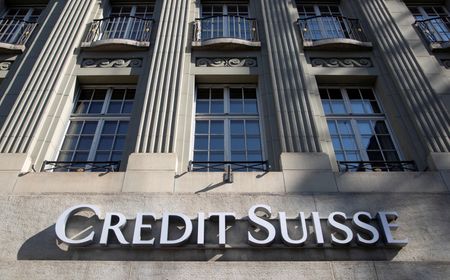 1
1 1
1

By Brenna Hughes Neghaiwi
ZURICH (Reuters) – Credit Suisse warned on Wednesday of a likely second-quarter loss as volatility hit its investment bank, the third quarter in a row for which Switzerland’s second-largest bank has issued a profit warning.
The bank has described 2022 as a “transition” year in which it is trying to turn the page on costly scandals that brought a near-total reshuffle of top management and a restructuring seeking to curtail risk-taking, particularly in its investment bank.
Announcing its third consecutive quarterly profit warning, the lender said it now aims to bring cost savings forward, speeding up measures introduced as part of its reorganisation in November targeting 1.0 billion-1.5 billion Swiss francs ($1.03 billion-$1.54 billion) in structural cost savings annually by 2024.
“Given the economic and market environment, we are accelerating our cost initiatives across the group with the aim of maximizing savings from 2023 onwards,” it said in a statement, adding further details would be provided at an investor update on June 28.
The bank is considering job reductions as part of the cost cuts, Bloomberg reported on Wednesday. Credit Suisse declined to comment on potential staffing cuts.
Pinning an anticipated group-wide loss on its investment bank, the lender said the Russia-Ukraine war and significant monetary tightening had led to weak customer flows and clients reducing their borrowings so far in the second quarter, particularly in the Asia-Pacific region.
“The impact of these conditions, together with continued low levels of capital markets issuance and the widening in credit spreads, have depressed the financial performance of this division in April and May,” Credit Suisse said.
They are also “likely to lead to a loss for this division as well as a loss for the group in the second quarter of 2022,” it added. It did not give an estimate of the second-quarter loss.
Shares slid 7.3% in early trading as analysts pointed to the particular impact of market conditions on a bank in restructuring mode and concerns that cost savings will not generate future earnings growth.
“Similarly to cost measures executed in the past, the consequence is likely to be a further erosion in staff morale and therefore another negative impact on revenues,” Vontobel analyst Andreas Venditti said in a note.
BAD WEATHER
Credit Suisse Chief Executive Thomas Gottstein is due to present on Thursday at the Goldman Sachs European Financials Conference, where heads of European banks will provide further insight into how the war, spiking energy prices and the interest rate environment are impacting their businesses.
Last week the heads of U.S. banks warned about the health of the global economy, with JPMorgan CEO Jamie Dimon speaking of a coming “hurricane” and Citigroup chief Jane Fraser saying Europe was more likely than the United States to slip into a recession.
Major central banks, already plotting rate hikes in a fight against inflation, are preparing a common pullback from key financial markets in a first-ever round of global quantitative tightening expected to restrict credit and add stress to an already-slowing world economy.
Beyond the challenges of the macroeconomic environment, Credit Suisse is contending with its own overhaul and a series of setbacks that have shaken investor confidence in the bank. Ratings agencies Fitch and Standard & Poor’s both downgraded its debt ratings in May.
Credit Suisse said its second-quarter earnings would also be hit by continued volatility in the market value of the bank’s 8.6% holding in Allfunds Group.
The bank said it now planned to operate at a group-wide Common Equity Tier 1 ratio, its key capital metric, of around 13.5% “in the near term”, below its 2024 target for above 14% and its 2021 and first-quarter CET1 ratios of 14.4% and 13.8% respectively.
($1 = 0.9751 Swiss francs)
(Reporting by Brenna Hughes Neghaiwi; Editing by Miranda Murray, Robert Birsel, Rashmi Aich and Jan Harvey)